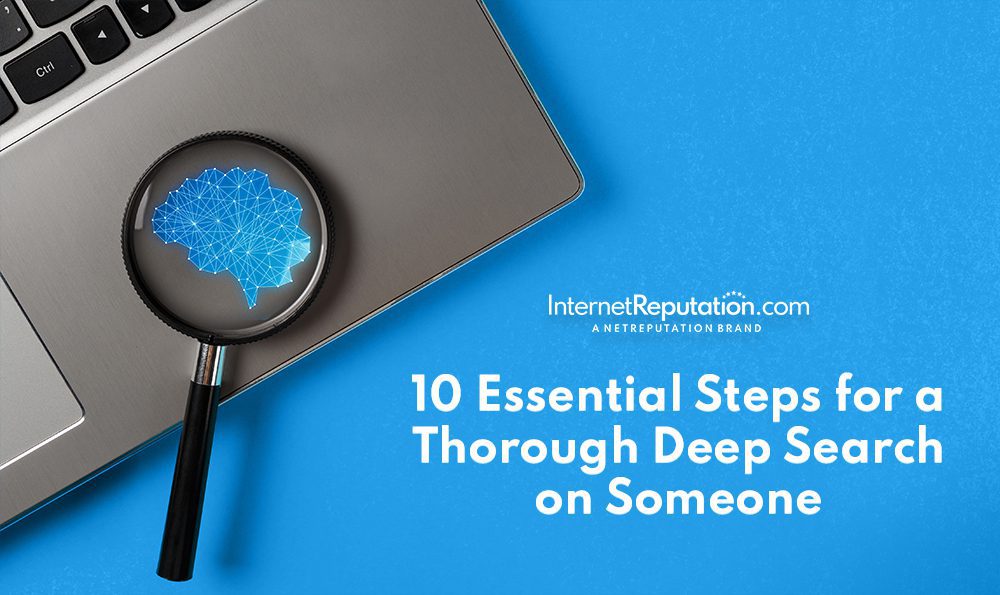10 Essential Steps for a Thorough Deep Search on Someone

Are you curious about someone’s background or want to know more about them? Conducting a deep search can provide you with valuable information. From basic search engines to social media platforms and public records, there are various sources you can utilize.
Key Takeaways:
- Conduct a deep search for someone to uncover important information and protect yourself from potential risks.
- A deep search can reveal a person’s professional history, background, and criminal records.
- To conduct a thorough deep search, combine search engines, social media platforms, public records, and background check services.
Why Conduct a Deep Search on Someone?
Conducting a deep search on someone can unveil hidden information and provide a comprehensive understanding of their background, affiliations, and activities.
A deep web search can be particularly beneficial in various situations, including hiring new employees to ensure honesty and qualifications. By looking into an individual’s digital footprint, one can uncover any red flags that may not be readily apparent during traditional interviews. Moreover,
deep searches can also assist in verifying credentials, validating professional history, and identifying potential conflicts of interest. It is crucial to approach these investigations cautiously, as excessive intrusion into someone’s personal life can raise ethical concerns and legal implications.
What Information Can Be Found Through a Deep Search?
A deep search can reveal an individual’s online presence, personal history, professional details, and potentially sensitive data.
One can gather details about a person’s interests, hobbies, and connections by looking into various online activities. Social media profiles offer insights into their social circles, preferences, and even recent activities.
Public records like property deeds, court cases, and financial information can comprehensively depict someone’s background. Accessing this data may also carry risks, such as potential privacy breaches and unauthorized use of personal information.
Step 1: Determine Your Purpose for the Search
Before beginning a deep search, it is crucial to define the specific purpose or objective behind the search, whether for personal, professional, or security reasons.
Setting a clear goal at the outset helps navigate the vast expanses of the Deep Web and Dark Web more efficiently. Verifying identities is often a common motivation, especially when authenticity is paramount, such as online transactions or relationships. Conducting searches to investigate potential risks associated with certain individuals or activities can provide valuable insights for preemptive measures. Gathering background information on a subject or entity can aid decision-making by comprehensively understanding relevant contexts.
Step 2: Create a List of Keywords and Relevant Information
Compiling a comprehensive list of relevant keywords and information is essential for conducting an effective deep search, as it helps narrow search results and focus on specific areas of interest.
When creating your list of keywords, it’s crucial to include terms directly related to the target individual or subject. Utilizing exact names, places, dates, and specific identifiers can refine your search significantly. For instance, instead of searching for ‘famous actor,’ including the ‘John Doe Hollywood movies 2000s’ could yield more relevant results.
Combining keywords with related entities can also enhance the search process. For example, pairing the ‘Jane Smith Nobel Prize’ with ‘biology research papers’ can lead to a more tailored outcome. Remember to consider different variations and synonyms to capture diverse information.
Step 3: Start with Basic Search Engines
Initiating the deep search process with basic search engines can provide initial insights into an individual’s online presence, public records, and digital footprint.
While traditional search engines like Google, Bing, or Yahoo serve as convenient entry points into the World Wide Web, they have limitations in accessing certain types of information, such as obscure databases, hidden websites, or private social media accounts. These search engines are designed to crawl and index web pages within their parameters, often unable to delve deeply into specialized sources or encrypted platforms.
By expanding the search horizon to include specialized search engines, various scientific and academic databases, and open-source intelligence tools, researchers can unearth a wealth of data beyond the scope of conventional searches. Specialized search engines like DuckDuckGo for anonymous browsing or Wolfram Alpha for computational knowledge offer unique functionalities and access to varied datasets that aren’t readily available through mainstream search engines.
What are the Best Search Engines for Deep Searches?
Several other search engines cater to deep searches, offering specialized features and capabilities for accessing hidden or sensitive information beyond what traditional search engines provide.
One notable example is the Tor Browser, which focuses on privacy and anonymity by routing internet traffic through volunteer-operated servers. Users can access the dark web and sites not typically indexed by conventional search engines. Specialized anonymous browsers like DuckDuckGo and Disconnect Search prioritize user data protection and do not track search history.
For users interested in secure image hosting platforms, services like Piwigo and Cryptee ensure encrypted storage of images, preventing unauthorized access. These platforms are ideal for those seeking privacy and security when managing and sharing photos online.
Step 4: Utilize Social Media Platforms
Exploring social media platforms can yield valuable insights into an individual’s personal life, connections, interests, and activities, making it a crucial step in a deep search process.
By looking into various social media platforms, one can uncover a treasure trove of information that ranges from basic demographics to detailed preferences and behavioral patterns. Profiles offer glimpses into someone’s past and present, while posts provide real-time updates and opinions. Interactions with others offer a window into social circles and relationships, drawing a comprehensive picture of the individual’s online footprint. Understanding how to navigate privacy settings becomes essential to ethically accessing the right data.
Analysis of social media content involves probing beyond surface-level information, discerning nuances, sentiments, and clues that shape a person’s digital persona. It’s like deciphering a virtual puzzle filled with thoughts, emotions, and activities. By interpreting online behaviors, one can gain valuable insights into motivations, interests, and potential connections, refining the search process further.
What Information Can Be Found on Social Media?
Social media platforms host diverse information, including personal details, social connections, activities, interests, and multimedia content, which can contribute to a comprehensive deep search.
One aspect that makes social media data rich for analysis is the variety of content available. The depth of information is vast, from profile data like age, location, and occupation to posts that reveal thoughts, opinions, and daily routines. Images shared on platforms provide visual insights into users’ lives, preferences, and experiences. Interactions such as likes, comments, and shares offer valuable clues about relationships and influences. When analyzing this content, identifying recurring patterns and cross-referencing information from diverse platforms can reveal deeper insights into behaviors and trends.
Step 5: Check Public Records and Government Databases
Accessing public records and government databases can offer valuable information on an individual’s legal history, property ownership, medical and financial records, and other official data, enhancing the depth of a deep search.
These resources serve as a treasure trove for researchers, investigators, and individuals looking to delve into someone’s background.
- Court records can unveil past legal disputes, criminal charges, and civil judgments, giving insights into a person’s character and behavior.
- Medical records provide details on health conditions, treatments received, and any underlying issues that could impact decision-making processes.
- Government reports can illuminate public service involvement, regulatory compliance, and financial disclosures.
It’s crucial to navigate these sources ethically, respecting privacy rights and legal boundaries.
What Types of Public Records Can Be Accessed?
Public records encompass a wide range of documents, including court records, property records, marriage certificates, birth certificates, criminal records, and more, all of which can be accessed to enrich a deep search.
In a comprehensive public records search, individuals can delve into a treasure trove of information that offers insights into various aspects of someone’s life. These records are categorized into legal documents, financial statements, personal histories, and professional licenses. Each category provides unique details that can paint a complete picture of an individual’s background and activities.
By cross-checking data from different public record sources, researchers can verify the accuracy of the information and ensure a comprehensive understanding. Integrating relevant keywords and entities related to public records is essential to uncover deeper insights and establish contextual relevance in the search results.
Step 6: Look into Professional and Personal Websites
Exploring professional and personal websites can reveal detailed information about an individual’s professional background, achievements, interests, and affiliations, providing valuable insights in a deep search.
When looking into professional websites, one might discover a wealth of data such as work experience, educational qualifications, publications, and industry recognition. On the other hand, personal websites could offer glimpses into hobbies, passions, volunteer activities, and individual projects.
It is crucial to scrutinize the content quality, consistency, and relevance of the information presented on these sites to ensure accuracy and authenticity. Examining domain registration details can help verify the legitimacy of the website’s ownership while evaluating the source of information and cross-referencing it with reputable sources, which can enhance the credibility assessment. Utilizing advanced search techniques and tools can aid in uncovering hidden details or connections that might not be immediately visible.
What Information Can Be Found on Professional Websites?
Professional websites typically showcase an individual’s resume, work experience, professional achievements, publications, and endorsements, offering valuable insights into their career trajectory and expertise.
These websites are virtual extensions of a professional’s identity, serving as a digital portfolio that illustrates their journey, talents, and contributions. Users can often find detailed information about the individual’s educational background, certifications, and specialized skills, providing a comprehensive overview of their qualifications. Visitors need to verify the authenticity of the presented information, ensuring that the details are accurate and up-to-date. Showcasing industry affiliations, professional organization memberships, and field contributions enhances the website’s credibility and trustworthiness.
What Information Can Be Found on Personal Websites?
Personal websites often contain blogs, creative portfolios, hobby details, personal projects, and social engagement activities, providing a glimpse into an individual’s interests and endeavors.
These sites offer a space for individuals to share their unique stories, experiences, and perspectives through personal narratives, which can enlighten visitors seeking to understand the individual on a deeper level. Creative works such as artwork, photography, music compositions, and graphic designs showcased on personal websites showcase the creator’s talent and passion.
Step 7: Utilize People Search Engines
Leveraging people search engines can streamline gathering information about individuals by aggregating data from various sources such as social media profiles, public records, and online platforms.
By harnessing dedicated people search engines, individuals can access a wealth of data that might not be easily obtainable through conventional methods. These platforms employ advanced data aggregation techniques, gathering information from various sources to paint a comprehensive picture of a person’s background.
The intricate search algorithms utilized by these engines enhance the efficiency of standard search engines in locating specific details, ensuring that users can sift through vast amounts of data swiftly. The ability to fine-tune search parameters enables individuals to tailor their queries for more precise results, saving time and effort.
What Are the Best People Search Engines?
Several reputable people search engines offer robust features for deep searches, providing comprehensive profiles, contact details, and social media links to enhance the search process.
One prominent platform is known for its user-friendly interface, which allows users to input various search parameters to refine their results. These engines allow users to access detailed background information, criminal records, and even public records, making them valuable tools for various purposes.
Another key feature of these search engines is their ability to connect users with lost family members or friends through advanced algorithms that sift through vast databases to provide accurate matches. It is essential, however, to double-check the information obtained from these sources by cross-referencing data and verifying its authenticity before making any decisions based on them.
Step 8: Check Online News and Media Sources
Reviewing online news and media sources can provide valuable insights into an individual’s public presence, affiliations, activities, and interactions, offering a comprehensive view of deep searches.
By regularly monitoring various online platforms, including news articles, press releases, and digital publications, researchers and investigators can unearth a wealth of information crucial for conducting thorough inquiries. The significance lies in analyzing media coverage, identifying emerging trends, and cross-referencing data from different sources to validate findings and gain a holistic understanding of a subject’s profile.
Tracking keywords and entities across multiple news outlets and platforms enhances the depth of research and helps connect the dots to uncover hidden connections or patterns that might go unnoticed otherwise.
Step 9: Use Online Background Check Services
Engaging online background check services can provide comprehensive reports on an individual’s criminal history, financial records, employment background, and personal data, enhancing the thoroughness of a deep search.
One of the key benefits of using online background check services is their ability to access a wide range of information sources, ensuring a more in-depth analysis of an individual’s background. These services often utilize advanced algorithms and databases, leading to higher data accuracy and report depth than traditional methods. Reputable online background check providers ensure compliance with relevant laws and regulations, offering peace of mind regarding the legality and trustworthiness of the obtained information.
What Are the Most Reliable Background Check Services?
Reputable background check services offer reliable data on an individual’s criminal records, employment history, financial standing, and personal background, providing a comprehensive overview for deep searches.
These top-quality online services ensure the accuracy and depth of information by utilizing advanced screening processes that scour various databases and sources. They compile detailed reports in user-friendly formats, allowing easy interpretation of the findings. The data sources used by these services are vast and diverse, ranging from government records to private databases, ensuring a thorough background check. Individuals and organizations must verify the information obtained from these reports to make informed decisions, considering legal implications and privacy concerns.
Step 10: Verify Information and Cross-Check Sources
Verifying information and cross-checking sources are essential in ensuring the accuracy and reliability of data obtained through a deep search, helping validate findings and mitigate potential misinformation.
When conducting a thorough information verification process, it’s crucial not to rely solely on a single source. By cross-referencing data points from various reputable sources, one can better discern the accuracy of the information. This practice safeguards against unwittingly spreading false data and promotes a culture of critical thinking and responsible information dissemination.
Paying attention to the credibility of the sources is paramount. Evaluate the providers’ trustworthiness, expertise, and potential biases to ensure that the information you rely on is trustworthy and reliable. By maintaining data integrity through meticulous fact-checking and source validation, individuals can contribute to a more informed society and combat the dissemination of misinformation.



